Considering the overwhelming number of water softeners available in the market, choosing the best water softener can be challenging.
If you are unaware of water softeners, here is a little introduction for you.
A water softener removes minerals such as calcium and magnesium from the water supply system. You might be wondering why you need to soften your water supply and spend money for it.
Hard water (means water with increased presence of magnesium and calcium) can lead to a high amount of deposits of limescale in your water supply. The deposit of limescale can block water pipes, can damage water based equipment such as heating system, cooling system and washing machine.
Therefore, softening water can increase the longevity of your household appliances that use water. Now you have an idea of the importance of a water softener. Let’s look at some of the best available water softeners in the market.
Contents
- 1 Best Water Softeners In The UK
- 2 How Does A Water Softener Work?
- 3 How To Buy The Best Water Softener
- 4 Different Types of Water Softeners:
- 5 Best Water Softener Reviews in the UK:
- 6 Which Water Softener is Best?
- 7 Benefits of Water Softener
- 8 Frequently Asked Questions:
- 8.1 1. Are Water Softeners Safe?
- 8.2 2. Do Water Softeners Need Electricity?
- 8.3 3. Do Water Softeners reduce water pressure? / do water softeners affect water pressure?
- 8.4 4. Is Water Softener water safe to drink?
- 8.5 5. Does a water softener remove iron, chlorine and calcium?
- 8.6 6. Can water softeners cause skin problems?
- 9 Conclusion:
Best Water Softeners In The UK

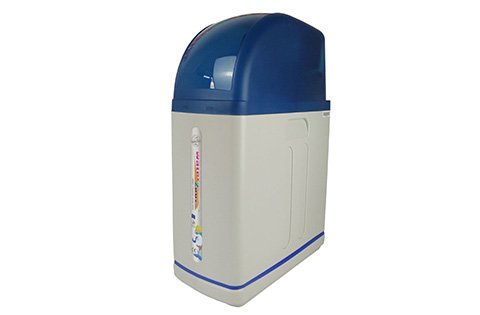
- Water2Buy W2B200
- Flow Rate - 118 litres/minute
- Family size - 1-4 people
- Salt capacity - 19 Kg
- Warranty - 7 Year

- Water2Buy W2B800
- Flow Rate - 118 litres/minute
- Family size - 1-10 people
- Salt capacity - 39 Kg
- Warranty - 7 Year
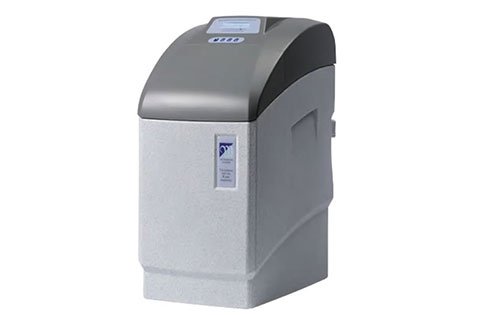
- Monarch Midi FreeFlow
- Flow Rate - 78 litres/minute
- Family size - 1-5 people
- Salt capacity - 15 Kg
- Warranty - 7 year
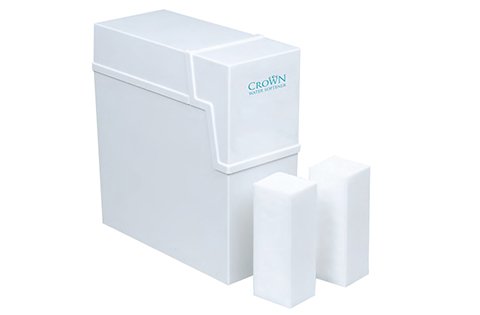
- Harvey Crown
- Flow Rate - 50 litres/minute
- Family size - 1-5 people
- Salt capacity - 2 x Block Salt (8kg)
- Warranty - 5 year
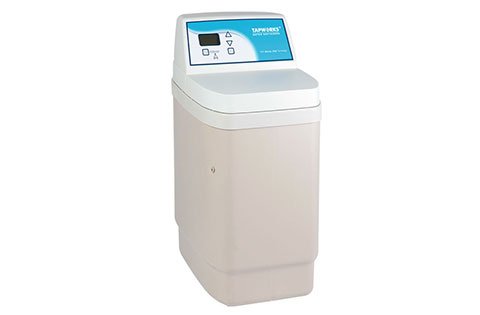
- Tapworks AD11
- Flow Rate - 53.3 litres/minute
- Family size - 1-7 people
- Salt capacity - 37 Kg
- Warranty - 2 year parts warranty, 10 year warranty on resin vessel
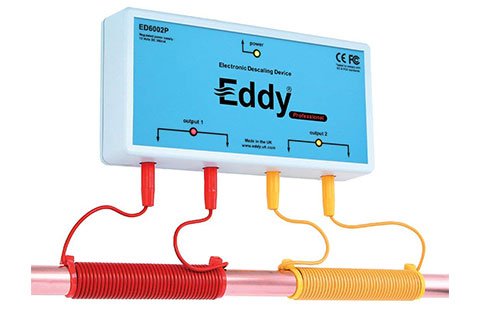
- Eddy Electronic
- -
- -
- -
- Warranty - 1 Year Money-Back Guarantee + Lifetime Repair or Replace warranty
How Does A Water Softener Work?
Ion exchange is the process through which a water softener softens the water. The traditional water softener models available today conduct this process using a resin tank, a brine tank and salt. The resin tank contains small resin beads covered with salt ions. The salt ions attract the hardness ions (Calcium and Magnesium).
Therefore, when hard water passes through the resin tank, the hardness ions get exchanged by softness ions. When the resin beads become exhausted, more salt is added to the brine tank to recharge the resin beads.
Through this process, the brine tank releases the excess minerals in the draining system. Hence, the resin tank starts regenerating soft water. The frequency of regeneration depends on the design of the water softener.
How To Buy The Best Water Softener
Following are some of the basic qualities you should check before you buy a water softener:
The Price:
The first concern for most of you is the price. Is it worth the money? The prices of water softener vary depending on the design. There are several types of water softener available. You need to choose the one that provides the best service, at the best price for you.
In addition to the price, you should consider the product’s durability, the running cost, repairing cost and the support system required for that water softener to ensure that it’s worth spending that initial amount to purchase that unit.
The Capacity:
You can choose the size of your water softener using the following calculation. This calculation is for water softeners that regenerate every week:
Number of People × 75 Gallons of Water per Person × {1 GPG + 0.0 mg/l Iron} = Total grains per day that must be removed.
In place of 75 gallons of water per person, you can also use the amount of water used per person in your household. You can estimate this amount from your usage report of your water bills.
However, while considering the capacity of the water softener regarding the volume of grain water, you should also consider how much salt and water the softener might consume. The consumption of salt varies depending on the capacity of the resin beads. The quantities of resin beads are measured in cubic feet.
For example, a softening unit of 1 cubic foot of resin will consume less salt compared to a softening unit of 0.75 cubic feet of resin. Therefore, a unit with a higher volume of resin might cost more during the initial purchase, but its maintenance cost (cost of salt) in the long run will be less compared to a unit with a lower volume of resin.
Flow Rate:
Flow rate of the water softener refers to its capacity to provide soft water in gallons per minute. This capacity depends on the length and width of the softener and its distribution system. You can check the flow rate capacity from the product manual.
Installation Requirements:
Installation of a water softener can be easy or daunting depending on its type. You should install the water softener in a location where it will be easy to connect to household water supply system.
You should not install your water softener outdoor with exposure to freezing or direct sunlight or anything that can damage the equipment. Any damage from these will disqualify you from claiming your warranty benefits. You might need professional assistance to set up the system.
You might also need a permit as per requirement of building codes to install the system. Check the installation process of the water softener you intend to buy. You should be able to check this online from the website of the manufacturers.
Warranty & longevity:
One crucial aspect of your buying decision should be the warranty offered by the manufacturer. The most popular water softeners in the market usually offer a 5-year long warranty for parts and labour. Salt based water softeners can serve you for 10-20 years. However, the softener might need some maintenance such as replacing the resin beads to ensure optimal level of service.
Different Types of Water Softeners:
While choosing your water softener, you need to understand the technology used by that water softener and its effectiveness to serve your purpose. Some of the water softeners available today are salt-based softener, salt-free softener, electricity based softener, water-power based softener, time-operated softeners and water meter-controlled softeners. The quality of a water softener’s service will vary depending on its technology.
Time-Based Softener:
The time-based water softener will generate soft water at a regular interval. Factors such as the hardness of the water, the amount of soft water needed and the production capacity of the unit determine the interval. This kind of softener is optimal for households where water usage remains same.
Meter-Based Softener:
The meter-based softener can produce soft water based on the changing demand of water. If the volume of water used in your household keeps changing, this might be suitable for you. The meter based softeners usually operate with electricity and are efficient.
Non-Electric Softener:
if you do not want to increase your electricity bill, then this is perhaps the best softener for you since it uses only water pressure to operate and to produce soft water.
Best Water Softener Reviews in the UK:
Here is a review of top 5 best water softeners in the UK. If you are planning to buy a water softener, you should consider buying one of these.
Water Softener Meter Water2Buy 200
Water2Buy 200 is one the most popular and highest rated water softeners. If you go by the appeal to popularity, then you should go for this one without further questioning. It can serve a household of 4 people with the ability to produce 1250 litres of soft water. It can treat water with the hardness of up to 400 PPM at maximum.
This softener can remove lime-scale by 100%. The Water2Buy200 is an automatic meter softener, and you can install it under your kitchen sink. It comes with most of the fittings necessary. The only thing you will need to add is braided hoses. You should install the softener should in a cold water supply.
The installation process is easy, and various resources are available to help you through it. You can use the guidebook or their customer service or the Youtube video to assist you with the installation process. This softener is compatible with most of the heating systems in the UK.
It is also efficient in its use of salt. According to customer feedback, you need only a 25 kg salt bag in every 5-6 weeks for this whereas salt is required every day in many manual softeners. The manufacturer provides you with a 30-day money back offer and a 7-year warranty.
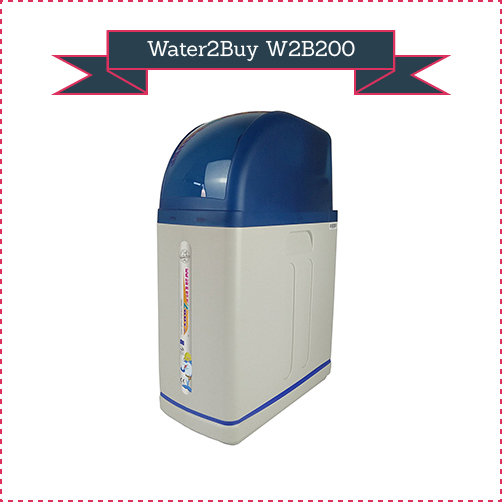
Monarch Midi Metered Water Softener
Another popular water softener is the Midi softener from Monarch Water. The Midi comes in three different sizes to suit the purposes of different family sizes and different water quality.
The MiniAqua can serve a family size of 1-3, the medium one can serve five people, and the master one can serve up to 7 people. The softeners of Monarch have installation kits and flexible hoses to suit all kinds of plumbing system. It also has a water test kit so that you can check the quality of your water.
You can seek help from their customer service to help you choose the right kind of Monarch water softener for your home. The Monarch water softener has all the advantages of the softener from Water2Buy. However, this softener has an additional benefit regarding the flow rate of soft water.
It has the highest flow rate of soft water among all the available water softeners. It also has the great advantage of regenerating soft water based on your water usage pattern. The manufacturer offers you seven years of warranty for parts and two years of warranty for labour.
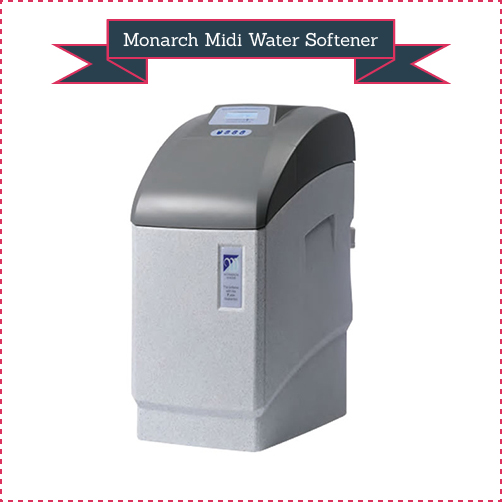
Harveys Crown Water Softener
One of the most popular water softeners in the non-electric category is the twin tank softener from Harveys Crown. One of its unique features is its twin tank which reduces wastage and maintenance cost.
This softener can generate soft water as well as clean its resin beads simultaneously without interrupting the water flow. This softener’s use of water pressure instead of electricity makes it a lucrative option. It uses block salt which makes it easier to load the salt in the machine.
All the fittings necessary and a water testing kit is available with the package. It does not require any adjustment even if the consumption of water varies. It automatically measures the right amount of water. The only thing that needs checking is when to load the salt. The warranty for this product is five years for parts and five years for labour.
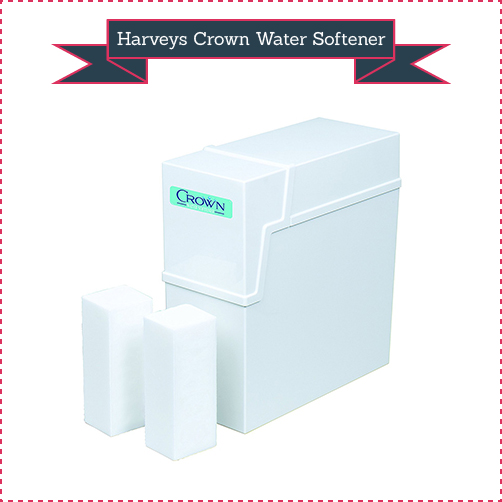
Tapworks AD11 Water Softener Meter Controlled
This softener can serve a family of around four people if the average usage per person is 75 gallons daily. It comes with 22 mm inlet/outlet hoses, 15 mm adaptors and high flow valves.
The AD11 works perfectly with any tablet salt and does not affect the flow of water significantly. You can expect a maximum flow rate of 53.3 litres/minute. The manufacturer provides 10-year long warranty for its resin vessel. The offer also includes two years parts and labour guarantee.
It is a metered water softener which tracks the amount of water usage. It also has the feature of automatic proportional recharge. The manufacturer also provides assistance through their team of plumbers for installation.
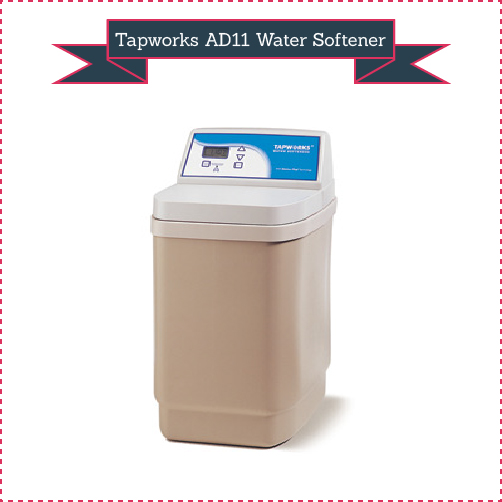
Eddy Electronic Water Descaler
Eddy Electronic Water Descaler is an eco-friendly alternative of traditional salt-based water softeners. It does not soften the water in the way a water softener does. It only suspends the buildup of lime scale in the water supply system.
Eddy descaler uses magnetic fields to prevent the buildup of limescale instead of completely removing the components. It is inexpensive, easy to install and runs on little power. The Eddy softener does not need salt and hence does not add any sodium in the water. However, this system will only provide satisfactory results if the hardness of water is less than 20 GPG.
It will not provide satisfactory service in areas where the hardness of water is more than 20 GPG. It is also not recommended for large households such as households with more than one bathroom. Even though Eddy descaler does not remove limescale by 100%, you can consider it because the manufacturer provides a lifetime warranty for the breakdown.

Which Water Softener is Best?
One common issue with Water2Buy 200, Tapworks AD11 and Monarch Midi water softeners is that these models have only one tank or vessel to process the hard water whereas the Harveys Crown water softener has twin tanks. Therefore, these three models might work less efficiently compared to the Harveys Crown model, especially during the regeneration or cleaning process. Moreover, the Harveys Crown water softener operates using water pressure and does not require electricity. However, the Harveys Crown model cost almost two times more than these three models. While all of these three models have similar features and benefits, the Water2Buy 200 offers the best price. Therefore, considering the price, quality, warranty and reviews of customer satisfaction, Water2Buy 200 is the best buy.
Benefits of Water Softener
Benefits of water softener are manifold. Following are some of the most noteworthy benefits:
- Prevents the deposit of limescale in your water and increases longevity of appliances that use water.
- Removes harmful chemical components from water which can cause dry hair and dry skin.
- Beneficial for your clothes since fabrics will last longer and brighter if you use soft water to wash clothes.
- Your heating system will work better because it is easier to heat soft water than hard water. It also means your heating system will have to use less energy and therefore lower energy consumption and expense for you.
Frequently Asked Questions:
1. Are Water Softeners Safe?
Water softeners that use salt can be harmful to your plants if you live in a place where there is not enough rainfall to wash away the salt deposited from your softened water. One way to avoid this can be not to connect your water line or pipes used for gardening to your water softener. If you are worried about the impact of salt used in the softener, you can use a water softener that does not use salt to soften the water.
2. Do Water Softeners Need Electricity?
There are various kinds of water softeners available in the market. Some of them need electricity to operate, and some of them do not, depending on the technology used. Therefore, you can check the design and buy according to your preference.
3. Do Water Softeners reduce water pressure? / do water softeners affect water pressure?
A water softener does not reduce the water pressure but can reduce the water flow. Water flow refers to the volume of water delivered in litres per minute, and water pressure is the force or speed at which that water is delivered.
Usually, the control valve and the resin bed of a water softener might contribute to the loss of water flow. However, manufacturers of water softeners consider this issue while designing their models and try to create models which will ensure the regular flow of water.
A sudden drop in the water flow can also happen if the softener is installed incorrectly. In the long run, it can happen if the resin tank gets clogged by sand from water pipelines or by the growth of algae or bacteria (in cases where the softener is installed in direct sunlight). If the resin bed/tank gets clogged, it needs to be cleaned or replaced to solve the problem.
4. Is Water Softener water safe to drink?
Yes, but to a certain extent. According to the UK Department of Health, the amount of Sodium in drinking water should not exceed 200mg/l*. During the water softening process, the concentration of sodium in the water changes due to ion exchanges. Whether or not the softened water is safe to drink depends on the level of calcium carbonate in the hard water.
If the level of calcium carbonate is more than 435 mg/l, then it is possible that the level of sodium in the softened water will exceed the level of 200mg/l. Hence, it will be wise to check your water with a water test kit to see the level of calcium carbonate before installing a water softener.
People who need to be on a ultra-low-sodium diet for medical reasons should avoid drinking artificially softened water since the calcium ions get replaced by sodium ions in the water softening process. For this kind of people, potassium chloride can be used instead of sodium chloride to soften the water.
Nonetheless, potassium chloride can pose health risks for people with kidney disease or diabetes. Therefore, people on ultra-low-sodium diet and people who have kidney disease or diabetes will be better off if the avoid drinking artificially softened water.
However, installing water softener does not necessarily mean that you will have to drink soft water. You can always install a separate tap for hard water or drinking water which will not be connected with your water softener. Many water softener manufacturers usually supply a special tap for this purpose.
5. Does a water softener remove iron, chlorine and calcium?
Both salt-free and salt-based water softener can remove calcium. It might remove iron and chlorine. You might want to use a water filter system as well if you want to remove iron and chlorine from your water.
6. Can water softeners cause skin problems?
One of the benefits of water softeners is that they can help you to improve your skin. However, the water softener cannot help with treating any chronic skin disorder.
Conclusion:
You have a better understanding now about the benefits of using a water softener. Hopefully, this buying guide has provided you with sufficient guidelines to make the right choice.
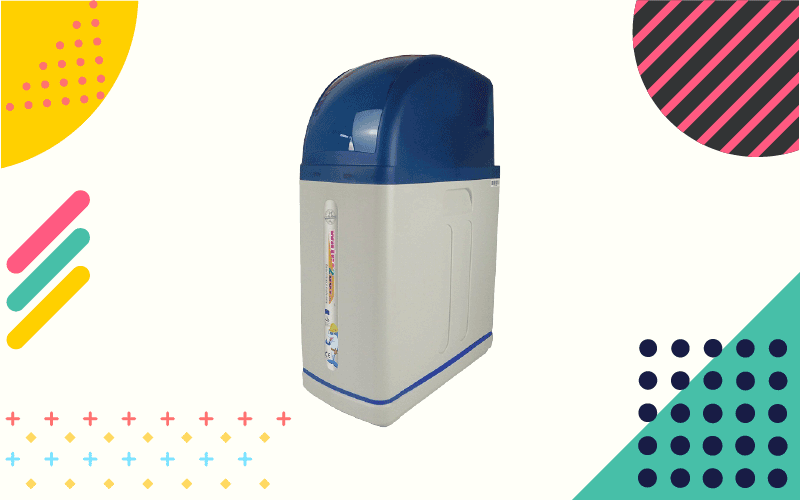

Great job.. Thanks for sharing this post. !!
nice one, thanks